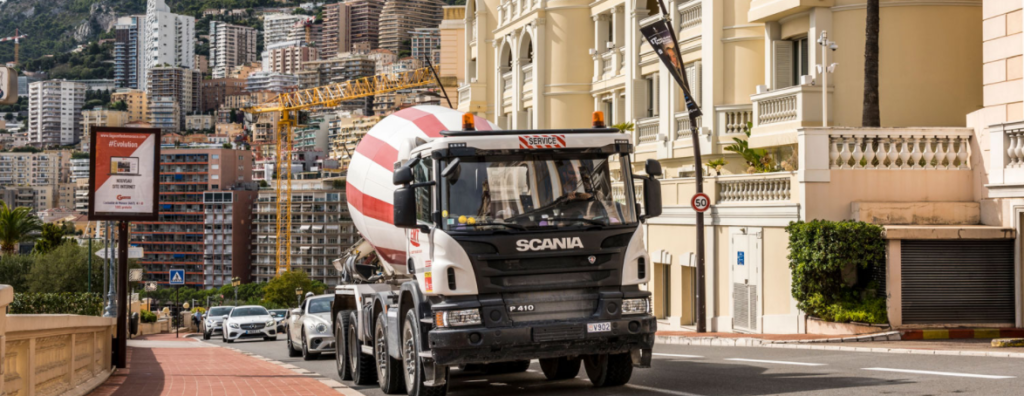From the marina filled with luxury yachts to the surrounding hills lined with buildings, Monaco is a dense principality with narrow and winding roads. In this intense traffic, one of Ecotrans’ Scania P 410 concrete mixers deftly maneuvers.

What may seem like a classic mixer truck is, in fact, a tangible expression of the sustainability approach adopted by Entreprise Monégasque de Travaux (EMT) and Ecotrans throughout its fleet. Fuelled by biodiesel produced from rapeseed, the trucks also feature electrically-powered mixers.
The group EMT Group with Ecotrans is specialized in the production, sale, and transport of ready-mixed concrete. Philippe Ortelli, President of EMT and Ecotrans, says:
“We are committed to the environment. These are not just words but the heartfelt commitment of the group”.
With a production capacity of 130,000 cubic meters of concrete per year, EMT has developed low carbon concrete as well as installing recycling systems for water and rock with the aim of achieving zero waste.
Considering all stages of production, concrete is responsible for 4–8% of the world’s CO2 emissions. Only coal, oil, and gas are a greater source of greenhouse gases. Half of the concrete’s CO2 emissions are created during the manufacture of clinker, the most-energy intensive part of the cement-making process.
EMT has been instrumental in changed regulations for lower CO2 emissions
EMT has developed its low carbon concrete made of cement, ground granulated blast-furnace slag, fly ash, and aggregates. For slag, EMT reuses waste from steel production, and the fly ash is sourced from power plants that still use coal to supplement electricity production during peaks. With its concrete, EMT has reduced carbon emission from 365 kg/m3 to 150–200 kg. “Overall in our production, we have achieved nearly a 50% reduction in carbon emissions compared to our competitors”, says Ortelli.
The company has selected the French biofuel B100 as the most sustainable alternative available, 100% sourced from rapeseed on fallow land, which reduces carbon emissions by 60%. Éric Humilier, Ecotrans’ Managing Director, says:
“It also meets our lifecycle and resale requirements. In six years when we renew our fleet, the trucks can join the traditionally used vehicle market”.
Ecotrans’ Scania XTs have reinforced chassis for the gross weight of 44 tonnes, a Monegasque particularity. Humilier adds: “We have been instrumental in changed regulations by putting forward environmental arguments: more volume of concrete transported means fewer trucks on the roads and lower CO2 emissions. We have estimated the reduction in traffic at 33%”.


 Copyright 2017-2025 All rights reserved.
Copyright 2017-2025 All rights reserved.